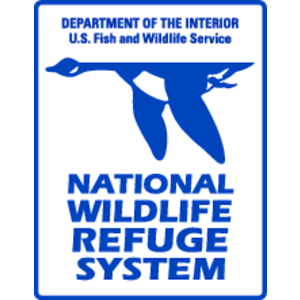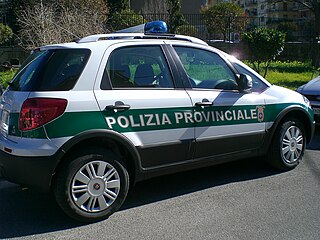
National Wildlife RefugeSystem (NWRS) is a system of protected areas of the United States managed by the United States Fish and Wildlife Service (FWS), an agency within the Department of the Interior. The National Wildlife Refuge System is the system of public lands and waters set aside to conserve America's fish, wildlife, and plants. Since President Theodore Roosevelt designated Florida's Pelican Island National Wildlife Refuge as the first wildlife refuge in 1903, the system has grown to over 568 national wildlife refuges and 38 wetland management districts encompassing about 856,000,000 acres (3,464,109 km2).
The Indiana Department of Natural Resources (DNR) is the agency of the U.S. state of Indiana. There are many divisions within the DNR and each has a specific role. The DNR is not only responsible for maintaining resource areas but also manages Indiana's fish and wildlife, reclaims coal mine ground, manages forested areas, aids in the management of wildlife on private lands, enforces Indiana's conservation laws, and many other duties not named here. According to the department's website, their mission is "to protect, enhance, preserve, and wisely use natural, cultural, and recreational resources for the benefit of Indiana's citizens through professional leadership, management, and education".

The Nebraska Game and Parks Commission (NGPC) is the State of Nebraska's State agency charged with stewardship of the state's fish, wildlife, state park, and outdoor recreation resources. The agency is led by a governor-appointed member commission consisting of 9 commissioners which directs agency management. The commission is also charged with issuing of state hunting licenses, fishing licenses, and boat registrations. The agency also manages State Parks and recreation areas throughout the state. It conducts public education programs for hunting and boating safety. The agency is headquartered in Lincoln, Nebraska.

In Italy, the polizia provinciale are the provincial-level police forces.

The Minnesota Department of Natural Resources, or Minnesota DNR, is the agency of the U.S. state of Minnesota charged with conserving and managing the state's natural resources. The agency maintains areas such as state parks, state forests, recreational trails, and recreation areas as well as managing minerals, wildlife, and forestry throughout the state. The agency is divided into six divisions - Ecological & Water Resources, Enforcement, Fish & Wildlife, Forestry, Lands & Minerals, and Parks & Trails.

The Wisconsin Department of Natural Resources (WDNR) is a government agency of the U.S. state of Wisconsin charged with conserving and managing Wisconsin's natural resources. The Wisconsin Natural Resources Board has the authority to set policy for the WDNR. The WDNR is led by the Secretary, who is appointed by the Governor of Wisconsin. The WDNR develops regulations and guidance in accordance with laws passed by the Wisconsin Legislature. It administers wildlife, fish, forests, endangered resources, air, water, waste, and other issues related to natural resources. The central office of the WDNR is located in downtown Madison, near the state capitol.

The Michigan Department of Natural Resources (DNR) is the agency of the state of Michigan founded in 1921, charged with maintaining natural resources such as state parks, state forests, and recreation areas. It is governed by a director appointed by the Governor and accepted by the Natural Resources Commission. Since 2023, the Director is Scott Bowen. The DNR has about 1,400 permanent employees, and over 1,600 seasonal employees.
The Pennsylvania Department of Conservation and Natural Resources (DCNR), established in 1995, is the agency in the U.S. state of Pennsylvania responsible for maintaining and preserving the state's 124 state parks and 20 state forests; providing information on the state's natural resources; and working with communities to benefit local recreation and natural areas. The agency has its headquarters in the Rachel Carson State Office Building in Harrisburg.

The California Department of Fish and Wildlife (CDFW), formerly known as the California Department of Fish and Game (CDFG), is a state agency under the California Natural Resources Agency. The Department of Fish and Wildlife manages and protects the state's wildlife, wildflowers, trees, mushrooms, algae and native habitats (ecosystems). The department is responsible for regulatory enforcement and management of related recreational, commercial, scientific, and educational uses. The department also prevents illegal poaching.

The Hawaii Department of Land and Natural Resources (DLNR) is a part of the Hawaii state government dedicated to managing, administering, and exercising control over public lands, water resources and streams, ocean waters, coastal areas, minerals, and other natural resources of the State of Hawaiʻi. The mission of the Hawaiʻi Department of Land and Natural Resources is to "enhance, protect, conserve and manage Hawaiʻi's unique and limited natural, cultural and historic resources held in public trust for current and future generations of the people of Hawaiʻi nei, and its visitors, in partnership with others from the public and private sectors." The organization oversees over 1.3 million acres of land, beaches, and coastal waters and 750 miles of coastal land.
The Pennsylvania Fish and Boat Commission is an independent state agency responsible for the regulation of all fishing and boating in the state of Pennsylvania within the United States of America. Unlike many U.S. states, Pennsylvania has a separate Game Commission.

A conservation officer is a law enforcement officer who protects wildlife and the environment. A conservation officer may also be referred to as an environmental technician/technologist, game warden, park ranger, forest watcher, forest guard, forester, gamekeeper, investigator, wildernessofficer, wildlifeofficer, or wildlife trooper.
The Alabama Department of Conservation and Natural Resources (ADCNR) is the state agency responsible for the conservation and management of Alabama's natural resources including state parks, state lands, wildlife and aquatic resources. ADCNR also issues hunting and fishing licenses for the state. The department promotes wise stewardship and enjoyment of the state's natural resources through five divisions: Marine Resources, State Lands, State Parks and Wildlife and Freshwater Fisheries. Supporting those divisions are seven support sections: Accounting, Diversity and Recruiting, Engineering, Information and Education, Information Technology, Legal, and Personnel and Payroll.
The Maryland Department of Natural Resources (DNR) is a government agency in the state of Maryland charged with maintaining natural resources including state parks, public lands, state forests, state waterways, wildlife, and recreation areas. Its headquarters are in Annapolis.

The Louisiana Department of Wildlife & Fisheries – Enforcement Division (LDWF) is the fish & game regulatory agency of Louisiana. It has jurisdiction anywhere in the state, and in state territorial waters. The agency enforces both state and federal laws dealing with hunting, fishing, and boating safety. The agency also enforces criminal laws in rural areas including DWI enforcement both on highways and waterways. Most of the Department's Wildlife Agents also carry Federal law enforcement commissions issued from the United States Department of the Interior - U.S. Fish and Wildlife Service, and United States Department of Commerce - U.S. National Marine Fisheries Service (NMFS). These federal commissions allow these state officers to enforce federal migratory waterfowl laws and federal marine fisheries laws in state and federal waters off the coast of Louisiana. Besides their traditional role as a "game warden", Louisiana Wildlife Enforcement Agents also have a number of other responsibilities, including conducting board of health inspections on some portions of the state's commercial fishing industry. Agents are trained in and conduct numerous search and rescue operations, both in remote land areas and on the state's waterways. Agents ensure that hunters, anglers, boaters, dealers, breeders, farmers, and transporters are in compliance with regulations governing equipment, quotas, licenses, and registrations. Agents also assist other State departments and law enforcement agencies in the coordination of educational and professional endeavors, as well as national and state emergency alerts by the Federal Office of Emergency Preparedness. In addition, agents perform search and rescue missions alone or in conjunction with other local, state, and federal agencies.
The West Virginia Division of Natural Resources (WVDNR) is an agency of the government of the U.S. state of West Virginia. While formerly known as the cabinet-level Department of Natural Resources, it is now part of the West Virginia Department of Commerce. The WVDNR is responsible for wildlife management, hunting and fishing regulations, and boater safety and also oversees state parks and resorts. It also operates the West Virginia State Wildlife Center, a zoo in French Creek that exhibits West Virginian wildlife.

The North American Game Warden Museum is a museum in the International Peace Garden on the Canada–United States international border between the Canadian province of Manitoba and the U.S. state of North Dakota. The museum is located on the American side of the border. Initially founded on a temporary basis at the International Peace Garden in the 1990s, it became a permanent museum in 2005.

The Massachusetts Environmental Police is a Massachusetts, US, state government law enforcement agency, which is the primary enforcement agency of Massachusetts's boating and recreation vehicle laws and regulations and is responsible for registering boats, off-highway vehicles and snowmobiles in Massachusetts. The agency is also responsible for the enforcement of fish and game laws, including commercial and recreational harvesting of the living marine resources along the state's coastline.

The South Dakota Department of Game, Fish, and Parks (GFP) is the U.S. State of South Dakota's state agency charged with the management of the state's public recreational and outdoor resources. The GFP manages the 13 state parks and 43 state recreation areas within the state parks system, totaling over 96,000 acres of public lands. The agency manages the hunting of game and the state's fisheries, manages several wildlife management areas and game production areas to restore or establish habitat for a variety of species. The agency conducts public outdoor education programs, typically focusing on hunting and boating safety. The department issues hunting and fishing licenses along with issuance of boat registrations. The agency is also charged with enforcement of fish and game laws, including invasive species regulations. The agency is headquartered in Pierre, South Dakota.














